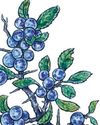
THE leaf litter and pine needles form a deep, springy mattress on the forest floor. Fallen boughs and the remains of tree stumps, rotting back into the ground, are as soft as sponges. Few people find their way to this mossy pocket of immemorial woodland on the edge of Dartmoor in Devon. Trees are multistemmed, hollow, tortuous in form, their branches green and woolly from lichens.
Hall Plantation on the Hall Farm estate, I am told by David Rickwood, site manager for the Woodland Trust, has all the characteristics of a temperate or Atlantic rainforest, a habitat formed by the constant presence of moisture in this case, rolling in from the sea and mild temperatures: 'It supports an ecosystem that is rarer than the Amazonian rainforest, if less obviously threatened.'
A beech, shaped like an octopus, has crashed to the ground, felled by the platelike bracket fungus that weakened its trunk. One limb still puts forth leaves, as it obstinately clings to life. This is a weird landscape, festooned with the hairy grey strands of Usnea articulata, similar to the Spanish moss that hangs from the live oaks of America's southern states (it was thought to resemble the Conquistadores' beards), but which in Devon is known, less romantically, as stringof-sausages. At least a dozen of Britain's 17 species of bat live here, diving into the crevices of senescent trees. The rotting timber is a Holiday Inn for invertebrates.
In the Middle Ages, this area supported four farms, the field patterns of which can still be seen. The name 'Plantation' suggests a more recent origin and probably dates from the time of the Napoleonic Wars, to judge from the dry-stone wall that surrounds the wood, although the early-19th-century plantings may have overlaid pre-existing woodland.
この記事は Country Life UK の October 05, 2022 版に掲載されています。
7 日間の Magzter GOLD 無料トライアルを開始して、何千もの厳選されたプレミアム ストーリー、9,000 以上の雑誌や新聞にアクセスしてください。
すでに購読者です ? サインイン
この記事は Country Life UK の October 05, 2022 版に掲載されています。
7 日間の Magzter GOLD 無料トライアルを開始して、何千もの厳選されたプレミアム ストーリー、9,000 以上の雑誌や新聞にアクセスしてください。
すでに購読者です? サインイン

Kitchen garden cook - Apples
'Sweet and crisp, apples are the epitome of autumn flavour'

The original Mr Rochester
Three classic houses in North Yorkshire have come to the market; the owner of one inspired Charlotte Brontë to write Jane Eyre

Get it write
Desks, once akin to instruments of torture for scribes, have become cherished repositories of memories and secrets. Matthew Dennison charts their evolution

'Sloes hath ben my food'
A possible paint for the Picts and a definite culprit in tea fraud, the cheek-suckingly sour sloe's spiritual home is indisputably in gin, says John Wright

Souvenirs of greatness
FOR many years, some large boxes have been stored and forgotten in the dark recesses of the garage. Unpacked last week, the contents turned out to be pots: some, perhaps, nearing a century old—dense terracotta, of interesting provenance.

Plants for plants' sake
The garden at Hergest Croft, Herefordshire The home of Edward Banks The Banks family is synonymous with an extraordinary collection of trees and shrubs, many of which are presents from distinguished friends, garnered over two centuries. Be prepared to be amazed, says Charles Quest-Ritson

Capturing the castle
Seventy years after Christian Dior’s last fashion show in Scotland, the brand returned under creative director Maria Grazia Chiuri for a celebratory event honouring local craftsmanship, the beauty of the land and the Auld Alliance, explains Kim Parker

Nature's own cathedral
Our tallest native tree 'most lovely of all', the stately beech creates a shaded environment that few plants can survive. John Lewis-Stempel ventures into the enchanted woods

All that money could buy
A new book explores the lost riches of London's grand houses. Its author, Steven Brindle, looks at the residences of plutocrats built by the nouveaux riches of the late-Victorian and Edwardian ages

In with the old
Diamonds are meant to sparkle in candlelight, but many now gather dust in jewellery boxes. To wear them today, we may need to reimagine them, as Hetty Lintell discovers with her grandmother's jewellery